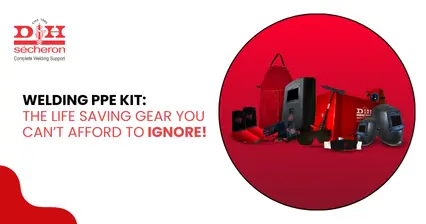The Impact of Material Selection on Welding Quality for D&H Sécheron
Introduction
In the world of welding, the choice of welding materials is a critical factor that significantly influences the quality and durability of the final product. D&H Sécheron, a leading player in the welding industry, understands the importance of selecting the right welding materials for various applications. In this blog, we discuss the impact material selection has on welding quality.
Material Compatibility:
One of the first factors that influence material selection in welding is the compatibility between the base material and the welding material. For instance, when dealing with a Steel Pressure Vessel, it's crucial to choose welding materials that are compatible with the vessel's base metal to ensure a strong bond and prevent material degradation over time.
Strength and Alloy Composition:
Low alloy steel is a common material in welding applications due to its excellent strength and corrosion resistance properties. The choice of welding material must complement the alloy composition of the base material to achieve a uniform and robust weld joint. D&H Sécheron offers a wide range of welding materials tailored to different alloy compositions.
Welding Process:
The welding process used also plays a pivotal role in material selection. Different welding processes, such as MIG (Metal Inert Gas) welding, TIG (Tungsten Inert Gas) welding, and submerged arc welding, require specific welding materials. For example, when using MIG welding for low alloy steel, selecting the right welding wire is crucial for achieving clean and strong welds.
Operating Conditions:
Consideration of the operating conditions is essential in material selection. For applications subject to extreme temperatures, pressure, or corrosive environments, the choice of welding material becomes even more critical. D&H Sécheron offers specialized welding materials designed to withstand such harsh conditions, ensuring the longevity and reliability of welded components like Steel Pressure Vessels.
Quality and Certification:
In industries like aerospace, automotive, and construction, adherence to industry standards and certifications is paramount. D&H Sécheron's welding materials often meet stringent quality and certification requirements, ensuring that the welds produced with their materials meet or exceed industry standards.
Cost-Efficiency:
While quality is of utmost importance, cost-efficiency cannot be overlooked. D&H Sécheron understands the need to balance quality with cost-effectiveness in welding projects. Their wide range of welding materials provides options that cater to various budgets without compromising on performance.
Ease of Use:
The ease of handling and using welding materials can impact welding quality. D&H Sécheron's welding materials are designed to be user-friendly, making them suitable for both seasoned welders and those new to the craft.
Conclusion:
Material selection is a crucial determinant of welding quality. D&H Sécheron's extensive range of welding materials, including welding wire for low alloy steel, is designed to cater to a variety of welding needs. By considering factors such as material compatibility, strength, welding process, operating conditions, quality, cost-efficiency, and ease of use, D&H Sécheron ensures that their welding materials contribute to the creation of robust and durable welds, whether in the fabrication of Steel Pressure Vessels or other critical applications. Making informed choices about welding materials is an essential step towards achieving high-quality, reliable welds that stand the test of time.
11 May 2025 | Welding
An In-Depth Exploration of Low-Alloy Steel: Your Comprehensive Guide
11 May 2025 | Welding
Nagpur - Bori - Tuljapur Road MSH-3 in Yavatmal District (Maharashtra)
11 May 2025 | Welding
Guidelines to Understand Gas Welding: Applications, Advantages & Disadvantages
11 May 2025 | Welding
3 Tips for Finding the Best Mild Steel Electrode for Your Application
11 May 2025 | Welding
How to Select the Right Welding Filler Wires for Stainless Steel Welding?
11 May 2025 | Welding
Building the Narendra Modi Stadium with Norma V and Autotherme-1 Electrodes
11 May 2025 | Welding
Low Alloy Steel Welding in a (PEB) Pre Engineered Building Structure
11 May 2025 | Welding
Welding Rods: Different Types and Tips for Properly Storing and Handling
11 May 2025 | Welding
Tips for Flawless Welds with Stainless Steel Electrodes: Pros and Cons
11 May 2025 | Welding
Exploring Applications and Benefits of Stainless Steel Welding Electrodes
11 May 2025 | Welding
Welding Basics: Joining Metals with Heat and Pressure - A Beginners Guide
11 May 2025 | Welding
Distinguishing Low-Alloy Steel from High-Alloy Steel: Understanding the Variations
11 May 2025 | Welding
Hard Facing Wire - Understanding the Process and Achieving Optimal Result
11 May 2025 | Welding
Exploring the Advantages of Stainless Steel Electrodes in Welding Applications
11 May 2025 | Welding
Weathering Steel vs. Traditional Steel: A Comparative Analysis of Performance
11 May 2025 | Welding
Choosing the Right Welding Rod: Why 6013 Electrodes Might Be Your Ideal Option
11 May 2025 | Welding
Why 7018 Electrodes Are Preferred for High-Strength Welds in Pipeline Construction
11 May 2025 | Welding
Filler Wire vs. Stainless Steel Filler Wire: Understanding the Key Differences
11 May 2025 | Welding
Exploring the Impact of Filler Material on Welding Quality and Durability
11 May 2025 | Welding
Choosing the Right Cast Iron Electrode for Different Welding Projects
11 May 2025 | Welding
Top Advantages of Cast Iron Electrodes for Industrial Welding Applications
11 May 2025 | Welding
Key Benefits and Challenges of Using TIG Welding in Industrial Projects
11 May 2025 | Welding
5 Reasons Why 7018 Electrode is the Gold Standard for Welding Professionals
11 May 2025 | Welding
Top 5 Advantages of Flux Cored Arc Welding for Heavy-Duty Applications.png)
11 May 2025 | Welding
Lotherme-601: A Game-Changer for Restoring Shoulder Pins in Heavy Machinery
11 May 2025 | Welding
How D&H Sécheron Helped Repair a Rotary Kiln’s Cooler Section with LoTherme 352
11 May 2025 | Welding
Piston Repair for Mining Industry: Cost-Effective Solutions with LoTherme 468.webp)






.jpg)








































.jpg)
.jpg)

.jpg)

.jpg)




.jpg)
.jpg)
.jpg)



.webp)
.jpg)
.jpg)
.webp)
.jpg)






















.png)



.webp)

.webp)
.webp)



